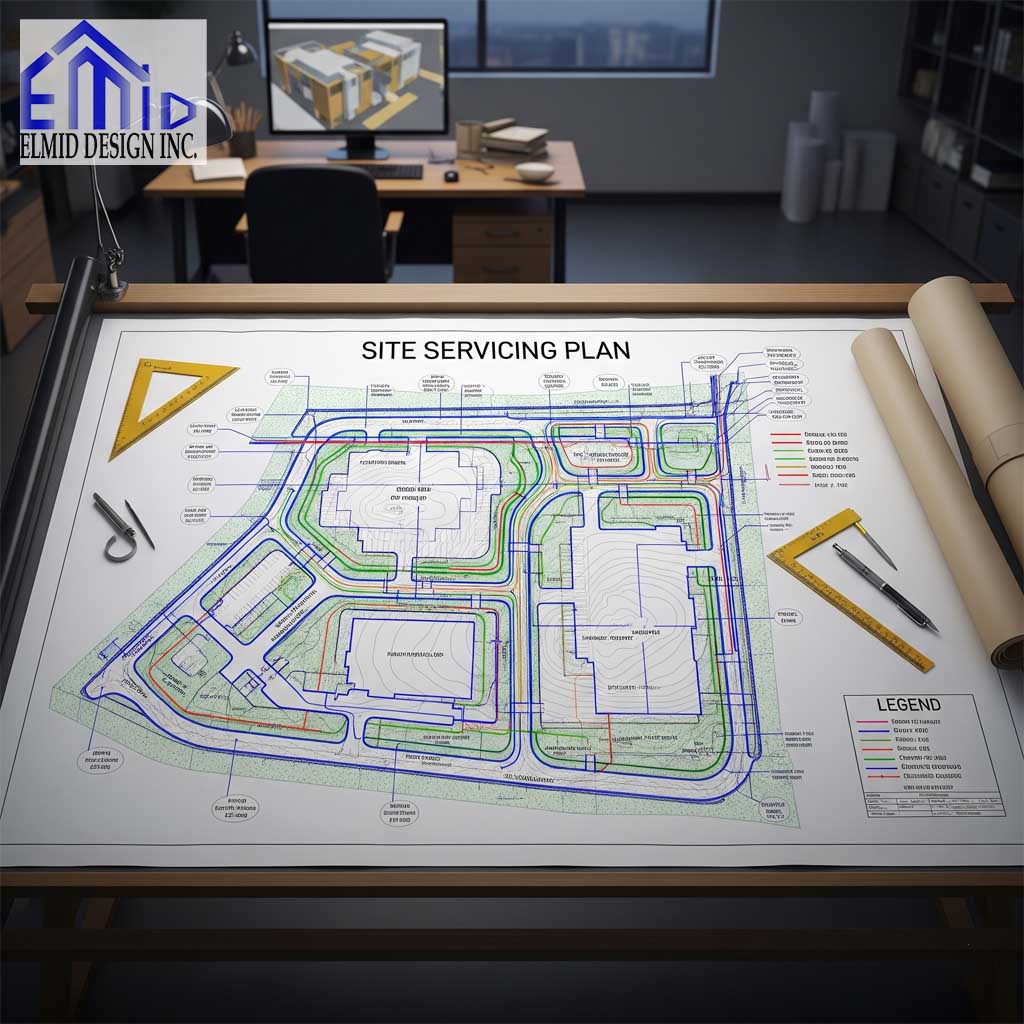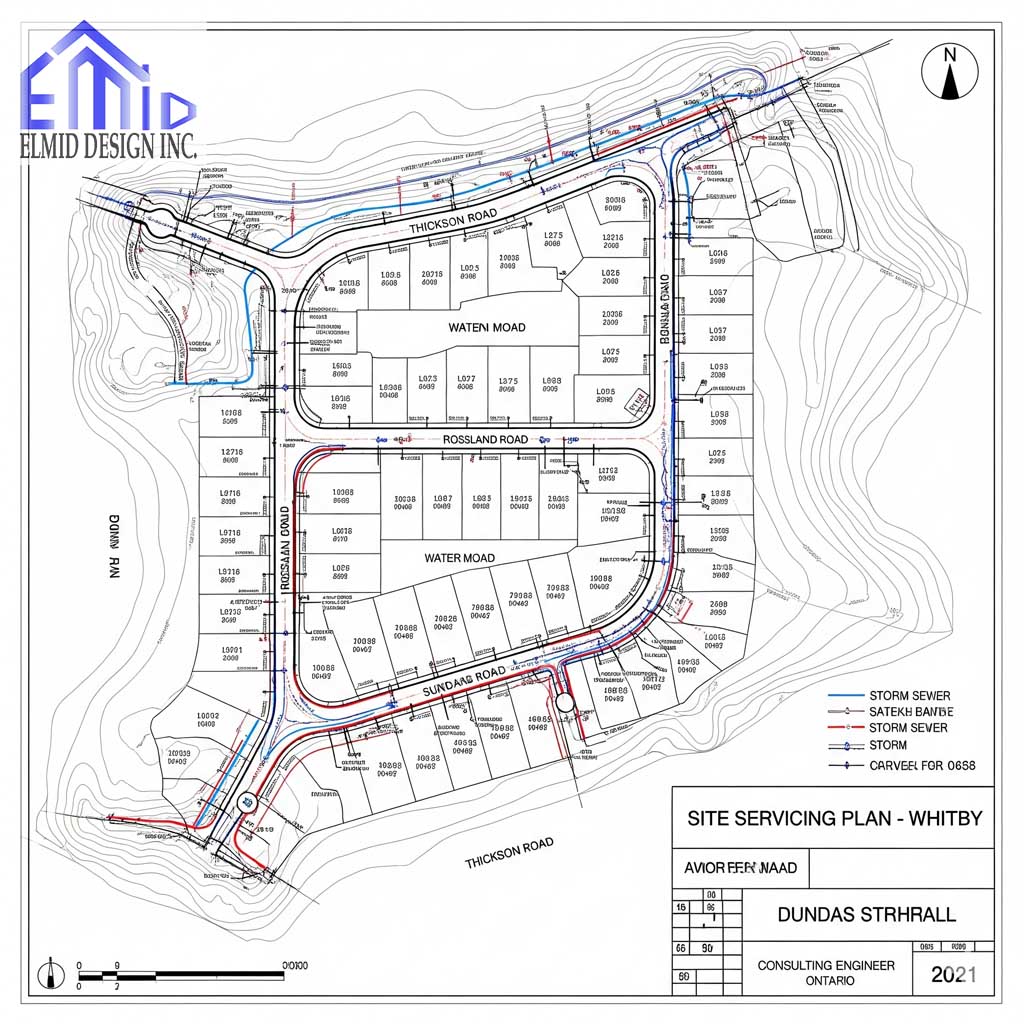A site servicing plan in Whitby plays a central role in every new building project. Whether you are constructing a commercial plaza, industrial facility, or residential development, the servicing plan shows how the site will connect to water, sanitary sewer, and stormwater systems. Without approval, your project cannot move forward. Understanding how Whitby regulates servicing, what details the plan must include, and why it ensures safety and compliance will help builders complete projects smoothly and avoid costly setbacks.
What is a Site Servicing Plan in Whitby
A site servicing plan in Whitby is a set of engineered drawings that illustrate how a property ties into municipal infrastructure. The plan includes underground watermains, sanitary sewers, and stormwater systems, along with grading and drainage patterns. It forms part of the site plan approval process required before construction permits can be issued. Municipal reviewers examine the drawings to confirm that the building will connect safely and that services can handle the proposed development.
Why Whitby Requires Servicing Plans
Whitby requires servicing plans to ensure that new development does not overload existing infrastructure or create drainage problems. Rapid growth across Durham Region places pressure on water and sewer systems. Proper design protects the community by ensuring reliable service and safe stormwater management. The Town also uses the plan to verify grading so that water drains away from buildings and into approved outlets. For builders, this requirement ensures long term functionality and compliance with local and regional standards.
Key Components of a Site Servicing Plan in Whitby
The main components of a servicing plan include underground service layouts, grading, and drainage details. Watermains must be designed with hydrants and connections for both safety and daily supply. Sanitary sewers require proper slopes for gravity flow or pumping stations if grades prevent it. Stormwater systems include catch basins, pipes, swales, and overland flow routes to control runoff. Grading plans show how the land slopes to direct water safely. Each component is reviewed in detail by municipal engineering staff before approval.
Whitby’s Site Plan Approval Process
The Town of Whitby requires builders to submit a site plan application that includes the servicing plan. The process begins with a pre consultation meeting to identify requirements. The applicant then prepares engineered drawings and submits them for review. Staff from planning, engineering, and sometimes conservation authorities examine the documents and provide comments. The applicant revises the plan until it meets all standards. Only after final approval can the development agreement be signed and servicing construction begin.
Grading, Servicing, and Drainage Permit for Infill Development
Whitby also requires a grading, servicing, and drainage permit for many infill projects. This applies when a new building or major addition alters site drainage, even on smaller lots. The permit ensures that runoff will not affect neighboring properties. Builders must submit grading and servicing drawings prepared by a licensed engineer. The Town reviews the proposal to confirm compliance with its standards before granting approval. Without this permit, infill development cannot proceed to construction or occupancy.
Stormwater Management in Whitby Servicing Plans
Stormwater management forms a critical part of every site servicing plan in Whitby. Engineers calculate how much runoff the site will produce during minor and major storms. The design includes systems to collect, convey, and safely discharge this water. Measures may also be required to improve water quality and protect nearby streams or wetlands. Overland flow routes provide emergency paths for water during severe events. Municipal staff review these details carefully because improper stormwater management can lead to flooding and erosion.
Utility Connections in Whitby
Utility connections for water, sanitary, and storm systems must be clearly shown in the servicing plan. Engineers design the location and depth of each pipe to tie into Whitby’s infrastructure or regional systems operated by Durham Region. Fire hydrants are positioned for safety and service reliability. Sanitary systems must maintain adequate slope for continuous flow, and pumping stations are sometimes added when gravity systems are not feasible. These designs are reviewed in detail to ensure they meet both municipal and regional standards.
Challenges and Risks in Whitby Servicing Plans
Builders in Whitby face several common challenges when preparing servicing plans. Limited capacity in existing water or sewer networks can delay projects until upgrades occur. Soil conditions and topography often complicate grading and drainage. Strict stormwater requirements protect the environment but demand precise design. Coordination with multiple reviewing agencies can create delays if submissions are incomplete. By working with experienced engineers who understand Whitby’s requirements, builders can anticipate these challenges and avoid costly redesigns during the approval process.

Cost Considerations for Servicing Plans in Whitby
The cost of a site servicing plan in Whitby varies with project size and complexity. Engineering fees cover surveys, designs, and calculations. The Town and Region charge review fees to process applications. Construction costs include installing sewers, watermains, catch basins, and grading. Developers must also provide financial securities that guarantee the completion of servicing works. These costs may appear high, but they protect both the municipality and property owners by ensuring safe and reliable infrastructure for every project.
Timelines for Approval and Construction
Approval timelines depend on the scope of work and the number of agencies involved. Smaller projects may receive approval in three to four months if drawings are accurate. Large subdivisions or complex developments often require a year or more. Builders must also account for construction time once approvals are granted. Servicing works such as grading, stormwater systems, and underground utilities may take several months to complete. Planning ahead helps avoid delays and keeps building schedules realistic.
Inspection Requirements During Construction
Approval of a servicing plan does not end the process. Once construction begins, inspectors from the Town and Region visit the site to confirm compliance with approved designs. Engineers monitor installation of watermains, sewers, and storm systems to ensure proper alignment and function. Erosion controls must remain in place throughout construction to protect the environment. If changes become necessary due to field conditions, engineers prepare revised drawings and resubmit them for review before work continues.
As Built Drawings and Securities Release
When servicing works are complete, contractors provide as built drawings that show the actual location and elevation of installed services. Engineers certify these drawings to confirm accuracy. The Town reviews the documents to ensure the final construction matches approved designs. Once staff confirm compliance, they release financial securities posted by the developer. Builders must complete this step before occupancy permits can be issued. Without as built drawings and certification, the municipality cannot accept the servicing works.
Role of Licensed Engineers in Whitby Projects
Licensed engineers play a crucial role in site servicing plans in Whitby. They design and seal the drawings, ensuring compliance with provincial and municipal standards. Firms such as Elmid Design Inc, which holds a Certificate of Authorization from Professional Engineers Ontario, provide expertise and accountability. Their involvement reassures municipal staff that the project meets safety and technical requirements. For builders, professional oversight reduces risks of rejected submissions, delays, and construction errors, making licensed engineering support essential.
Whitby’s Local Design Standards
Whitby follows its own design criteria while also applying Durham Region specifications for regional infrastructure. These standards define pipe sizes, material requirements, and grading practices. They also outline stormwater management expectations, including both quantity and quality controls. Builders must follow these standards closely since deviations require justification and often trigger delays. By aligning with local specifications from the beginning, developers increase their chances of receiving faster approvals from municipal engineering staff.
Environmental Compliance in Servicing Plans
Environmental protection forms a major part of servicing design in Whitby. Stormwater runoff must be managed to protect streams, wetlands, and Lake Ontario. Designs must control both flow quantity and water quality. Low impact development measures such as infiltration and bioretention may be required depending on site conditions. Conservation authorities may also review projects that affect sensitive areas. Ignoring environmental compliance leads to delays and redesigns, making early integration of these requirements critical for builders.
Long Term Responsibilities for Developers
Developers in Whitby often remain responsible for servicing works until the municipality formally assumes them. This means maintaining stormwater controls, repairing defects, and ensuring grading functions correctly. Builders who document inspections and repairs create a smoother transition when requesting municipal acceptance. Failing to maintain services during this period can result in delayed occupancy or withheld securities. Planning for long term responsibilities ensures projects stay on track and protects the builder’s investment.
Risks of Incomplete or Poorly Designed Plans
Submitting incomplete or poorly designed servicing plans in Whitby leads to costly consequences. The Town will not issue approvals if designs fail to meet engineering standards. Construction delays occur when contractors face unclear or conflicting drawings. Environmental authorities may demand redesigns if stormwater details are insufficient. Builders who cut corners risk fines, project delays, and damage to their reputation. Accurate, complete, and professional plans remain the only way to secure approvals and build with confidence.
Coordination with Utility Providers in Whitby
Utility providers play a critical role in site servicing projects. Hydro, gas, and communication lines must be coordinated with water, sanitary, and storm services. Engineers integrate these requirements into drawings to prevent conflicts. Builders who engage utility companies early avoid redesigns during construction. Proper coordination also reduces safety risks during excavation and ensures all connections are completed efficiently. In Whitby, utility coordination is not optional but essential for final project approval.
Future Proofing Development Projects in Whitby
Builders in Whitby benefit when they design servicing plans with future growth in mind. Oversizing certain pipes, planning for phased development, or allowing additional capacity reduces long term costs. Municipal reviewers often support designs that anticipate community growth because they ease strain on infrastructure. Builders who future proof their projects also avoid costly upgrades years later. A forward looking servicing plan demonstrates responsibility, efficiency, and commitment to long term value.
Role of Professional Engineers in Reducing Risk
Professional Engineers licensed in Ontario provide the expertise and accountability that municipalities demand. Firms such as Elmid Design Inc, authorized by Professional Engineers Ontario, deliver designs that meet technical and legal standards. Their involvement reassures municipal staff that the project will be built safely and correctly. Builders reduce risks of rejection, costly redesigns, and liability issues when they partner with licensed engineering firms. In Whitby, professional oversight remains essential for every servicing plan.
Importance of Long Term Maintenance
A servicing plan does not end once construction finishes. Developers remain responsible for the systems until Whitby formally assumes them. This period includes maintaining stormwater features, monitoring grading, and repairing minor issues. Builders who establish clear maintenance procedures avoid disputes and delays when the municipality reviews the project for acceptance. Effective long term planning ensures that the site functions correctly and that municipal staff trust the quality of the completed work.
Financial Planning for Servicing Works
Every servicing plan in Whitby carries financial responsibilities that extend beyond engineering and construction. The Town requires securities to guarantee completion of the works. These funds remain with the municipality until the project is accepted. Builders must plan cash flow carefully since securities tie up capital. Accurate cost estimates from experienced engineers reduce the risk of shortfalls. Financial preparation not only satisfies municipal requirements but also ensures projects stay on schedule without unnecessary funding delays.
Risks of Ignoring Local Conditions
Whitby’s unique geography demands close attention during servicing design. Clay soils, sloped terrain, and proximity to Lake Ontario affect how drainage and stormwater systems function. Builders who overlook these conditions face redesigns, delays, and higher costs during construction. Professional engineers evaluate site conditions and adapt designs to local realities. By addressing soil, slope, and environmental factors early, developers prevent failures and create plans that meet both municipal and practical requirements.
Integration of Building and Servicing Design
Building layouts and servicing systems are connected. The placement of parking lots, loading docks, and rooflines influences drainage and utility connections. If servicing plans are prepared without coordination, conflicts can appear that delay approvals. Builders who integrate servicing with architectural and structural designs achieve smoother reviews and fewer construction challenges. In Whitby, success depends on unified planning that considers both the building form and the supporting infrastructure at the same time.
Utility Coordination for Safer Construction
Every site servicing plan in Whitby must show how utilities integrate with water, sanitary, and storm systems. Utility providers require time to review and approve their part of the design. Builders who coordinate early with hydro, gas, and telecommunications companies avoid redesigns during construction. Clear drawings also reduce risks of service conflicts and improve safety for workers. Utility coordination stands as one of the most important yet often underestimated steps in the servicing process.
Future Proofing Development in Whitby
Designing with the future in mind creates lasting value for builders and communities. Oversized pipes, flexible layouts, and phased servicing options reduce the need for costly upgrades later. Municipal reviewers also support designs that prepare for growth since they reduce strain on community systems. Builders who future proof their servicing plans gain efficiency, avoid service disruptions, and position their projects as forward looking developments that meet long term needs in Whitby.
Professional Engineering Oversight
Licensed Professional Engineers ensure that servicing plans in Whitby meet municipal and provincial standards. Firms such as Elmid Design Inc, authorized by Professional Engineers Ontario, combine technical expertise with accountability. Their involvement speeds approvals, reduces risks of rejected submissions, and reassures municipal reviewers that the project is designed correctly. Builders who rely on licensed engineers gain confidence that their servicing plans support safe, efficient, and fully compliant development.
Site Servicing Plan Whitby: Closing Insights
For builders in Whitby, a servicing plan is not just a requirement but a blueprint for successful development. Long term maintenance, financial planning, local conditions, and utility coordination all determine whether a project runs smoothly. Future proofing designs and working with licensed engineers ensure lasting value and municipal approval. By approaching servicing with strategy and foresight, developers create projects that stand strong, meet community standards, and set the stage for building success in Whitby.
Site Servicing Plan Whitby: Final Perspective
A site servicing plan in Whitby is not only about drawings and approvals. It is a safeguard that protects infrastructure, the environment, and the community. Builders who understand the process and work with professional engineers gain smoother approvals, stronger designs, and lasting project value. By addressing long term responsibilities, coordinating utilities, and planning for growth, developers ensure their projects succeed. A complete servicing plan stands as the foundation for reliable, compliant, and future ready building in Whitby.
Best Practices for Builders in Whitby
Builders can streamline approvals by preparing complete submissions and coordinating early with engineers. Pre consultation meetings with municipal staff help identify specific requirements before design begins. Regular communication with reviewers ensures faster resolution of comments. Future proofing designs by allowing capacity for expansion or phased development also improves long term project value. Builders who approach servicing plans with careful planning and professional guidance reduce risks, control costs, and achieve approvals faster.
Site Servicing Plan Whitby: Conclusion
For builders, a site servicing plan in Whitby is more than a municipal requirement. It is a detailed blueprint that ensures safe connections to water, sanitary, and storm systems while protecting the environment. By understanding costs, timelines, inspections, and compliance, developers can plan projects realistically and avoid delays. Working with licensed firms such as Elmid Design Inc ensures designs meet Whitby’s standards and receive approval with confidence. A complete and well designed servicing plan sets the foundation for building success.
FAQs about Site Servicing Plan Whitby
What is included in a site servicing plan in Whitby
A site servicing plan in Whitby includes watermains, sanitary sewers, stormwater systems, grading, drainage, and utility coordination. It also shows erosion control during construction.
Who prepares a site servicing plan in Whitby
Only licensed Professional Engineers in Ontario can prepare and seal servicing plans. Firms like Elmid Design Inc hold the required Certificate of Authorization.
Why does Whitby require a servicing plan before building permits
Whitby requires servicing plans to confirm that new developments connect safely to infrastructure, manage stormwater properly, and protect nearby properties.
How long does it take to approve a site servicing plan in Whitby
Smaller projects may be approved in three to four months, while larger developments can take a year or more depending on complexity and agency reviews.
What happens after the servicing plan is approved
After approval, builders construct the services under inspection. Engineers provide as built drawings, and the Town reviews them before releasing securities and granting occupancy permits.
Do small infill projects in Whitby need a servicing plan
Most infill projects require at least a grading, servicing, and drainage permit. Builders must confirm requirements with the Town before beginning construction.

Elmid Design Inc: Leading Engineering Firm for Site Servicing in Whitby
Elmid Design Inc is a trusted engineering company with a Certificate of Authorization from Professional Engineers Ontario. The firm specializes in preparing site servicing plans in Whitby, including grading, drainage, stormwater management, and utility design. With proven expertise and a commitment to compliance, Elmid Design Inc helps builders and developers secure faster approvals and deliver reliable projects. By combining technical precision with local knowledge, the company ensures every project meets municipal standards while supporting long term building success.
Geographic Locations That We Service:
Our Licensed Professional Engineers specializing in Engineered Site Grading Plans offer the best-engineered site grading plan, lot grading and erosion plan, and drainage plan to obtain site plan approval and building permits in Ontario, including a wide range of municipalities. Each area boasts unique features and requirements, making our tailored approach essential for success.
Toronto and Surrounding Areas
In the vibrant heart of Ontario, we service Toronto (City of Toronto) and surrounding areas. Additionally, we cover Oshawa (City of Oshawa), Pickering (City of Pickering), and Clarington (Municipality of Clarington). Furthermore, our expertise extends to Ajax (Town of Ajax), Whitby (Town of Whitby), Brock (Township of Brock), Scugog (Township of Scugog), and Uxbridge (Township of Uxbridge).
Halton Region
Moving to the Halton Region, our services encompass Burlington (City of Burlington) and Halton Hills (Town of Halton Hills). Also included are Milton (Town of Milton) and Oakville (Town of Oakville).
Peel Region
In the Peel Region, we provide services in Brampton (City of Brampton), Mississauga (City of Mississauga), and Caledon (Town of Caledon).
York Region
Our services in the York Region cover Vaughan (City of Vaughan), Aurora (Town of Aurora), and East Gwillimbury (Town of East Gwillimbury). We also cater to Georgina (Town of Georgina), Markham (City of Markham), Newmarket (Town of Newmarket), Richmond Hill (City of Richmond Hill), Whitchurch-Stouffville (Town of Whitchurch-Stouffville), King (Township of King), and Bradford-West Gwillimbury (Town of Bradford-West Gwillimbury). Each municipality here offers a distinct setting, requiring our specialized approach.
Other Southern Ontario Cities and Towns
We also serve many other cities and towns in Southern Ontario. These include Hamilton (City of Hamilton), St. Catharines (City of St. Catharines), Niagara on the Lake (Town of Niagara on the Lake), Brant (County of Brant), Cambridge (City of Cambridge), Kitchener (City of Kitchener), Waterloo (City of Waterloo), and Woodstock (City of Woodstock). Furthermore, we operate in Guelph (City of Guelph), Centre Wellington (Township of Centre Wellington), Shelburne (Town of Shelburne), Orangeville (Town of Orangeville), New Tecumseth (Town of New Tecumseth), Essa (Town of Essa), Collingwood (Town of Collingwood), Wasaga Beach (Town of Wasaga Beach), Barrie (City of Barrie), Midland (Town of Midland), Orillia (City of Orillia), Ramara (Town of Ramara), Minden Hills (Town of Minden Hills), North Kawartha (Town of North Kawartha), Kawartha Lakes (City of Kawartha Lakes), Peterborough (City of Peterborough), Selwyn (Town of Selwyn), and Brighton (Municipality of Brighton).




